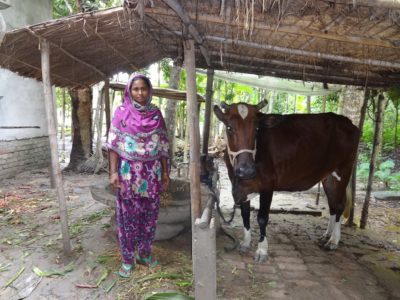
In 2014 I was selected to be part of the orange-fleshed sweet potato nursery, organized by the USAID Horticulture Project. When I began the nursery, I rented a 200 m2 plot of land. The USAID Horticulture Project provided nursery training and the minimum input cost to establish nursery.
From September 2014 to March 2015 I sold orange-fleshed sweet potato vines and made $330. The production cost was US$23 including land rental and all materials.
A couple of months ago I purchased a cow for US$280. After bringing the cow to the house, my family members were critical of the health of the cow as it was very thin and unhealthy.
I fed the cow orange-fleshed sweet potato vines twice a day and sometimes the roots from the orange-fleshed sweet potato nursery. Slowly the cow was became healthier and everyone was shocked to see the how much it improved.
This rainy season my neighbors decided to purchase some orange-fleshed sweet potato vines as cattle fodder for US$12.50. Now I feel proud as a female entrepreneur and orange-fleshed sweet potato nursery holder.
By eating orange-fleshed sweet potatoes, including the leaves, my family and my cow get more minerals and vitamins.
I will be continuing the orange-fleshed sweet potato nursery and raising the cow for my families daily dietary needs.
The USAID Horticulture Project in Bangladesh, partnering with the International Potato Center (CIP), AVRDC – The World Vegetable Center, BRAC and Bangladesh Agricultural Research Institute (BARI) are working with local farmers to diversify diets and agricultural production systems with potato, orange-fleshed sweet potato, summer tomato, and nutritious indigenous vegetables.
